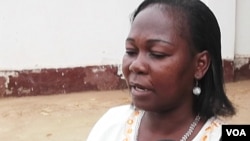AWEIL, SOUTH SUDAN —
A group of South Sudanese women, including several members of parliament, has kicked off a nationwide tour aimed at increasing women’s involvement in South Sudanese politics and lobbying for women’s interests.
A delegation of women from the SPLM's Women's League met in Aweil, in Northern Bahr el Ghazal, with more than 50 representatives of the state’s Women’s League to discuss political, social and educational challenges facing women.
Mary Naawai, a member of parliament for Western Equatoria state who was part of the women’s delegation visiting Aweil, said the immediate goal of the visiting group was to assess the tools available and build structures to boost women’s empowerment at the local level.
Naawai called for women of Northern Bahr el Ghazal to “go into the counties… to collect some data about the structures of women in this state.”
A key tool to the empowerment of women is improved education, members of the visiting delegation said.
Only around eight percent of women in South Sudan can read and write, according to the United Nations, and improving access to education for women and girls will help address many of the problems facing women, they said.
Some of the women leaders in Aweil called for increased representation of women in government and other public institutions.
South Sudan’s constitution currently requires 25 percent of all government positions to be filled by women.
In 2011, South Sudanese women held 88 of the 332 seats in the new country's lower house, or 26.5 percent, but only five of the 50 seats in the upper house, according to a tally compiled by the Inter-Parliamentary Union.
The women at the meeting in Aweil said they will never be elected to office without serious political and financial support.
Separate delegations of women plan to hold talks in all 10 states in South Sudan to try to find ways to address challenges facing women at the national level.
A delegation of women from the SPLM's Women's League met in Aweil, in Northern Bahr el Ghazal, with more than 50 representatives of the state’s Women’s League to discuss political, social and educational challenges facing women.
Mary Naawai, a member of parliament for Western Equatoria state who was part of the women’s delegation visiting Aweil, said the immediate goal of the visiting group was to assess the tools available and build structures to boost women’s empowerment at the local level.
Naawai called for women of Northern Bahr el Ghazal to “go into the counties… to collect some data about the structures of women in this state.”
A key tool to the empowerment of women is improved education, members of the visiting delegation said.
Only around eight percent of women in South Sudan can read and write, according to the United Nations, and improving access to education for women and girls will help address many of the problems facing women, they said.
Some of the women leaders in Aweil called for increased representation of women in government and other public institutions.
South Sudan’s constitution currently requires 25 percent of all government positions to be filled by women.
In 2011, South Sudanese women held 88 of the 332 seats in the new country's lower house, or 26.5 percent, but only five of the 50 seats in the upper house, according to a tally compiled by the Inter-Parliamentary Union.
The women at the meeting in Aweil said they will never be elected to office without serious political and financial support.
Separate delegations of women plan to hold talks in all 10 states in South Sudan to try to find ways to address challenges facing women at the national level.





